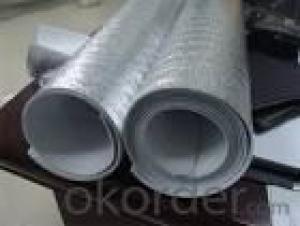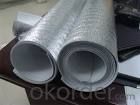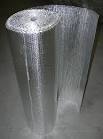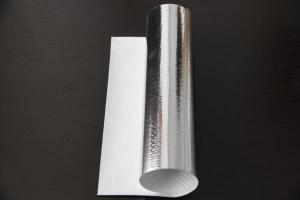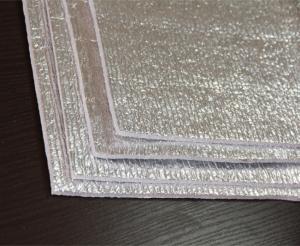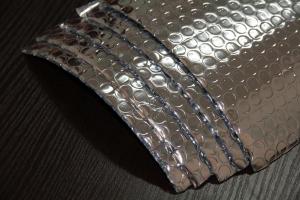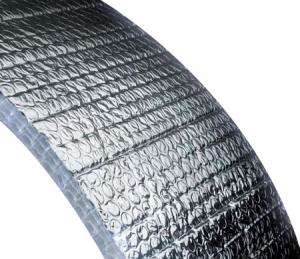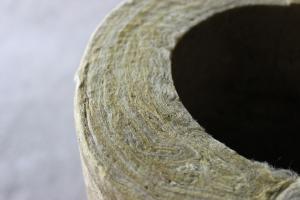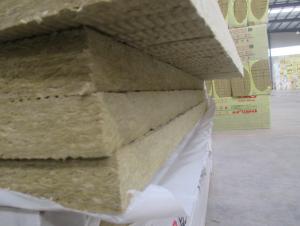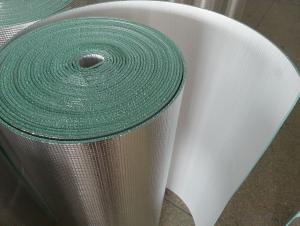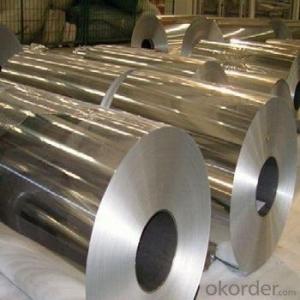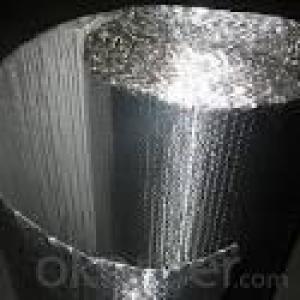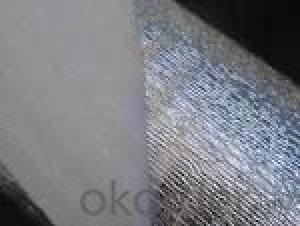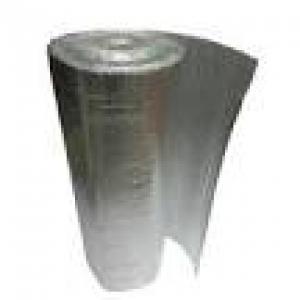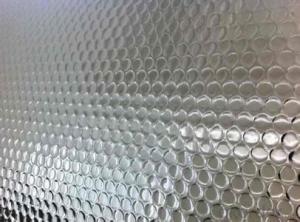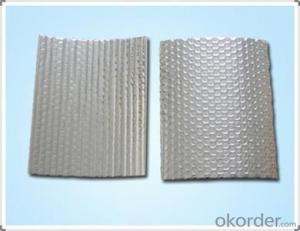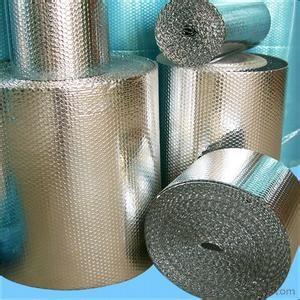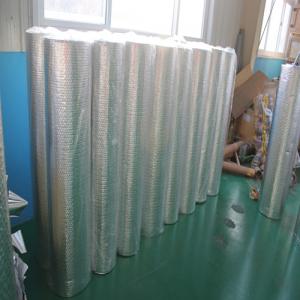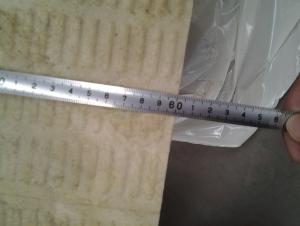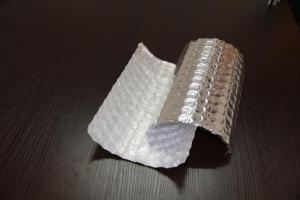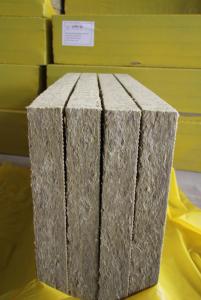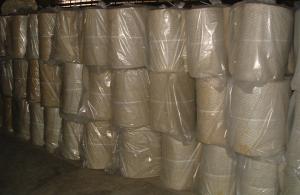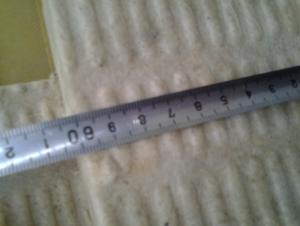Roofing Insulation Rock Wool Aluminum Foil Coated Bubble Insulation Type 25
- Loading Port:
- Shanghai
- Payment Terms:
- TT OR LC
- Min Order Qty:
- 10000 m²
- Supply Capability:
- 100000 m²/month
OKorder Service Pledge
OKorder Financial Service
You Might Also Like
Bubble Insulation Benefits:
Reflects 96% of radiant heat
Non-toxic / Non-carcinogenic
Does not require protective clothing or respirators to install
Durable and lightweight
Does not compress, collapse or disintegrate
Vapor and radon retarder
Easy to cut and install
Permanent and maintenance-free
Does not provide a growth medium or nutritive value for fungus, insects, or rodents
Does not support the growth of mold or mildew
Not affected by moisture or humidity
Lowers heating and cooling costs year round
Bubble Foil Application:
Metal & Steel Buildings
Homes
Roof Underlayments
Cathedral Ceilings
Crawl Spaces
Hot Water Heaters
Basement Walls
Floors
Garage Doors
Concrete slabs
Driveway snow melts
Pole barns
Post frame buildings
Poultry barns
Animal kennels
Temperature sensitive storage areas
Air Bubble Foil Insulation Tech Data:
Material Structure: AL/Bubble/AL | ||
Bubble Size:D10mm*H 4mm(10*2.5/10*4/10*6/20*7/25*10)choose the bubble size | ||
Bubble Weight:0.13kg/m2 ( can be customized ) | ||
Roll Width:1.2m (lenth can be customized) | ||
PROPERTIES | TEST DATA | UNIT |
Thickness | 3.5-4 | mm |
Weight | 250 | g/m2 |
Emissivity | 0.03-0.04 | COEF |
Thermal conductivity | 0.034 | w/m0 |
Apparent Density | 85 | kg/m3 |
Reflectivity | 95-96 | % |
Water Vapour Transmission | 0.013 | g/m2kpa |
Corrosion | doesn't generate | |
Tensile Strength(MD) | 16.98 | Mpa |
Tensile Strength(TD) | 16.5 | Mpa |
- Q: No insulation was installed under roof of my 2 story home. Im not rich but looking for info on installing about 450 ft. up there.
- Based on the geography you are put up insulation rates would differ, I would suggest initially you just call Insulation contractors who offer free home energy audits and ask them to give their estimate , based on the rates you choose one which suits your budget. Usually type of insulation you choose determines your rate, so do a little homework on it
- Q: I would like to find foam type tiles for my roof of decking, insulation?
- www.okorder I checked the website I posted by searching 'foam roofing' on google. This link is what I found but there are others... Google it to find your best deal. I think I will spray this stuff under my pier and beam home just to insulate. Thanks for the tip! I can buy this product, apply it myself and cut the cost down to 1/3 or more.
- Q: what effect does changing the pitch of a roof have on the insulation properties and durability of a roof?
- Increasing the pitch will of course result in a larger dead air space therefore more insulation. The greater pitch is also less likely to leak but of course more costly to construct as more material is needed. Install vents at the peaks for more efficiency. Shingles will be less likely to be lifted by high winds with the steeper roof also.
- Q: In a house, it looks like an addition, that now is the kitchen , it feels HOT, it doesn't seem to have a very good insulation on the roof at all, the ceiling is already low, so, what can be done on the outside to give it more insulation?, i don't care what it is i just want to give it a GOOD insulation, the roof is flat and to shingles. Any IDEAS? , thanks!
- Sorry but there isn't enough info to give a good answer...is there space between the ceiling and the roof to add insulation...there may be enough insulation but no ventilation in the area directly under the roof (atic area) If there is not enough air flow in this area the temperature will skyrocket thus heat the kitchen AND the shingles will deteriorate very quickly.If you still need to add insulation the best way is to put sloped roof (if possible)and add insulation in the space created or you can use foam insulation and re roof ..make sure you seal between the wall system and new insulation and whatever method make sure to allow air to flow under the roof (both inflow and outflow)
- Q: the name of the company is SIG plc.I need help asap, cos I am struggling to figure it out. If it is not, what kind of competition is it???
- I accept as true with a great sort of it and a couple of belts is ******* stupid surprisingly in case you will hand them to queen shiba gail kim. hogan is wearing tna is awfully unhappy. hes the only person who can cut back a first rate promo too yet I agree much less television time. they push and leap the gun on the worst mid carders or too quickly and its crap. television ma i like that yet carter is a crack whore. i understand perfect whats the factor of being stay on the timpact zone at properly-known? lol pathetic. no being loose wont help something. thats nwa hollywood mentality and loose tickets. tna provides loose tickets too. tna needs to basicly crank lower back the clock and be precisely like they have been in previous due 2009 and experience it out. hexagon greater helpful roster. greater fits and action. rapid little promos. forget approximately thoughts perfect now. do basically promos and fits. revive the knockouts branch. do away with that stupid gut examine. and al snow. taz needs to retire hes anoying now and argues too lots. revive tag communities. cut back the jerry springer horse **** brawls. not greater greater thoughts and promos thats it. purely hemme gets the mic and everybody needs to quit speaking and attempt against and having longer fits. austin aries is an over rated cm punk sort clone I agree. the place is velvet sky? matt morgan, pink, pete williams, kevin youthful is a clown now for knockouts macthes? wtf tna.... aj varieties slept with carter so he have been given mid carded?...
- Q: Rather than waste that heat on sunny days during the heating season, can it be used to help heat the home? Otherwise it would just passively be vented out. Has anyone done this? Is it a good idea or not?
- not unless you want to be showered with fiberglass particles.
- Q: What is the aim of insulation in walls and in roofs?
- Insulation can reduce your heating cost. Insulating your solid walls could cut your heating costs considerably, because solid walls let through twice as much heat as cavity walls do.
- Q: Can you put fiberglass insulation on the under side of roof tiles in the loft in the house?
- I would be concerned that this may cause moisture to form between the roofing and the insulation. They make a special foam panel that fit underneath the roofing in between the roof rafters. They allow air to flow from the eave to the roof's ridge.
- Q: Have a patio with metal roof, gets very hot during summer. Will Great Stuff insulate and stick to hot roof during summer? Thanks
- I don't think Great Stuff foam insulation is meant to be applied in the manner in which you need. It is used to fill gaps and cracks, not be sprayed out in thin coats. whenever I've used it in the past, I found out it did not like to be spread out, or "worked".
- Q: Finally remembering to do so, before my family and I left the house for approximately 4 hours, I turned off the heat before leaving. When we came home I turned it back on, but was shocked to see that the temperature had dropped 4 degrees in that time. 4 degrees in just under 4 hours seems like a lot of heat loss, does it not? I've seen the insulation in our roof and it's just that sawdust looking stuff spread everywhere. I feel like I'm paying a lot of unnecessary dollars for heating: the air does kick on every hour or two and we keep the thermostat at 68.Is it reasonable for me to talk to my landlord about this problem and getting better insulation in the ceiling, and maybe in the roof? (the master bedroom, on the far corner of the house, is always 2-3 degrees below the rest of the house). Are my expectations to not lose a degree of heat or more per hour unreasonable? Would a typical landlord consider this a problem worth discussing?
- The roof (assume pitched) doesn't need insulating it's above the attic above the ceilings of all the rooms that need 12 inch of mineral wool insulation to stop heat loss (you may have less thickness not all insulation is to the correct standards) Also if as I suspect the walls of your home are timber with shiplap (and not solid brick / cavity walls) they also require insulation top up. From a google search there is state wide Government grants for insulating homes, could be available in your state? using blown insulation to walls/ceilings. If you decide to install it yourself the payback is excellent -in 12 months depending on fuel cost and what existing insulation (from your description minimal) The landlord could be entitled to increase your lease costs if he takes the work on as he has greatly improved the thermal insulation which will reduce your heating costs and make his property more valuable to lease.
Send your message to us
Roofing Insulation Rock Wool Aluminum Foil Coated Bubble Insulation Type 25
- Loading Port:
- Shanghai
- Payment Terms:
- TT OR LC
- Min Order Qty:
- 10000 m²
- Supply Capability:
- 100000 m²/month
OKorder Service Pledge
OKorder Financial Service
Similar products
Hot products
Hot Searches
Related keywords
